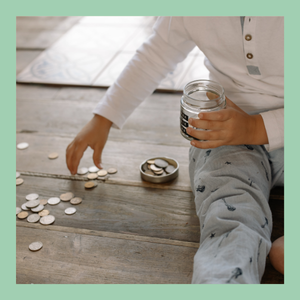Why Extreme Frugality Isn’t the Answer (and What to Do Instead)
Anita Dombovari
January 10, 2026
If you’ve ever gone down the personal finance rabbit hole, you’ve probably stumbled across the FIRE movement — Financial Independence, Retire Early. The dream: work like crazy now, save every penny, and retire at 35 to live out of a van and travel the world.
And I’ll be honest: I used to find it inspiring. Who doesn’t want the freedom to live life on their own terms? For a while, I thought the FIRE crowd had cracked the code: live extremely frugally, squirrel away massive savings, and then enjoy decades of freedom.
But here’s the problem I ran into: so much of FIRE content is rooted in extreme frugality. People skipping haircuts, canceling every subscription, cutting their own laundry detergent costs in half, and living in tiny homes or vans — all in service of financial freedom.
There’s nothing wrong with those choices if they genuinely make you happy. But for many people, it ends up feeling less like freedom and more like restriction.
Why Extreme Frugality Sounds Good on Paper (But Rarely Works)
Extreme frugality promises fast results. Spend less, save more — simple, right? The problem is that money isn’t just math. It’s also emotions, relationships, values, and daily habits.
Here’s what often happens with extreme frugality:
It turns daily life into a punishment. Every coffee or takeout meal feels like a “failure.”
It creates burnout. Willpower only lasts so long. Eventually, you splurge — and then feel guilty.
It makes you miss out on joy. Memories aren’t made by always saying “no.”
It can strain relationships. Try telling your friends you can’t join them because you’re saving for “future freedom.” That gets old fast.
Instead of feeling empowered, people end up anxious, guilty, or resentful of money. And honestly, I don’t think that’s what freedom looks like.
And perhaps the biggest cost of all? Extreme frugality shrinks your life.
Without a system to show you what’s truly possible, you end up saying “no” by default — not because you can’t afford something, but because you don’t know if you can. Instead of making intentional choices, you avoid opportunities out of fear of running out of money. That trip with friends, the course you wanted to take, even the weekly dinner out that helps you recharge — all of it gets cut, just in case. And in the process, you miss out on experiences you could have both afforded and enjoyed.
My Shift Away From FIRE Thinking
When I first discovered FIRE, I admired the discipline. But the deeper I went, the more I realized: I don’t actually want to retire at 35 if it means spending the next 40 years saying “no” to everything fun. I'm 37 now, so that ship has sailed anyway!
I don’t want to cut out every latte, every concert, every spontaneous dinner out.
I don’t want to live in a van (unless it’s a vacation I’m genuinely excited about).
And I don’t want to spend my life “optimizing” every penny if it means I never enjoy the present.
What I do want — and what I help my clients build — is a money system that makes room for both the future and the present. Because financial freedom isn’t just about quitting your job early. It’s about feeling calm, secure, and intentional with your money today, tomorrow, and ten years from now.
And to be honest, I've had a lot of loss of life around me. We must face the truth that we aren't going to live forever. I prefer to balance today's joy with tomorrow's responsibility.
Live like you're going to die tomorrow, but also plan for if you don't.
What to Do Instead: A Sustainable Approach
So if extreme frugality isn’t the answer, what is? Here’s the framework I use with my clients:
Clarity Over Chaos
Instead of ignoring your money until it’s a source of panic, get clear. Where is it going? What are your real priorities? Tools like YNAB help you see exactly what’s happening so you can make choices from a place of calm.Category Targets, Not Deprivation
Rather than saying “I can never eat out again,” set aside money for dining out. That way you can enjoy it without guilt, because it’s already part of the plan.Funding Future You Without Starving Present You
Savings matter. Debt payoff matters. But so does living your life right now. The balance is key. Think of it as both-and, not either-or. Black and white thinking will kill your spirit.Make It Personal
What lights you up may not be what lights up your neighbor — or the FIRE blogger living in a converted school bus. Your budget should reflect your values, not someone else’s blueprint for freedom.
The Bottom Line
Extreme frugality can look appealing on Instagram, but it often leads to burnout, guilt, and a life that feels smaller than you want. I believe financial freedom isn’t about cutting everything out — it’s about creating enough clarity and structure that you can spend money in ways that feel good, both now and later.
That’s why I use and teach YNAB. It’s not about restriction, it’s about intention. Every dollar gets a job — whether that’s building your emergency fund, paying for groceries, or buying that concert ticket you’ll remember for years.
Money is a tool, not a cage. You don’t need to be extreme to create freedom. You need clarity, intention, and a plan that honors the life you actually want to live.
Curious how coaching could help you break free from extreme frugality and create a sustainable money plan? Book a free intro call with me.
For YNAB-curious readers: Not using YNAB yet? You can grab a free 34-day trial here and see how empowering it feels to give every dollar a job.
When You Reset Your Relationship With Money
When you stop fighting your money, you start partnering with it.
That’s exactly what my new course, The Mind-Money Reset, is designed to help you do.
It’s an 8-week guided experience that blends reflection, clarity, and calm systems — so you can finally feel confident and at peace with money (no matter what’s in your account today). And when you feel more confident and calm about money, you can make your financial dreams come true — finally!
Be Part of the Beta Test
Before it officially launches, I’m opening 25 beta tester spots for people who want to experience the full course with me — for free (a refundable deposit helps keep everyone committed).
As a beta tester, you’ll get:
✅ Early access to the complete 8-week course (a $497 value)
✅ All exclusive bonuses as they’re created
✅ Personal guidance and a chance to shape the final version
✅ A full refund of your $97 deposit when you complete the course and share your feedback
If you’ve been craving a calm, grounded reset with money — not another budgeting challenge or self-improvement sprint — I’d love to have you join me.
Read more: How to use YNAB with Irregular Income

